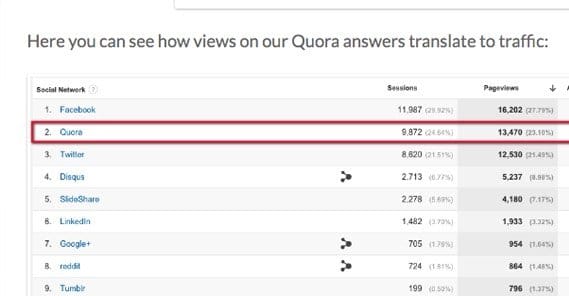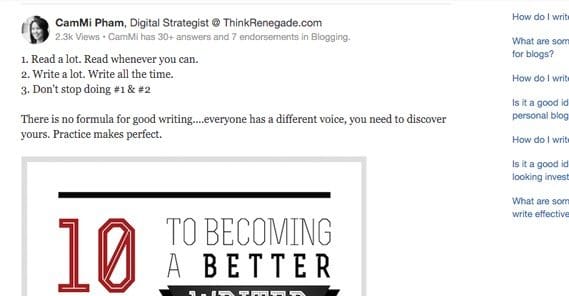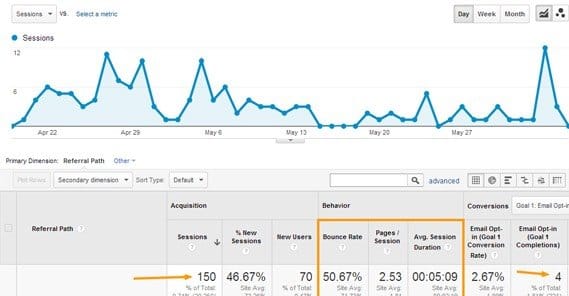How to Answer Quora Questions to Drive Traffic

Quora is sort of like a modern day Yahoo Answers, except with less anonymity, and thus more accountability. With that accountability comes a generally higher quality level for the questions and the answers. Instead of content like this, you get resources like this.
Quora is a site where people come to ask questions, and other people come to provide answers. Generally, when someone provides an answer, they give it context by explaining who they are and why they have the data or authority necessary to answer. For example, if I ask a question about neurosurgery, I might get three answers. One from a layman citing Wikipedia, one from a nurse who works in a neuropathy ward, and one from an actual neurosurgeon.
Obviously, I’m going to give more credence to the one from the neurosurgeon. On the other hand, if that same neurosurgeon starts answering questions about flying helicopters, I might be a bit more skeptical. They might have a pilot’s license and training sure, but they also might not.
Wishpond ran a study on Quora a few months ago. They received 13,000 views from Quora in the previous month, which is nothing to scoff at. It’s a significant influx of traffic, but it’s also better than that. It’s traffic coming to you from a place where you’re a demonstrated authority. They know who you are and they know that you bring value to the table. They aren’t disinterested users, nor are they users you have to convince to like your content; they already know you have value and they’re coming to check out what else you have on offer.
We’ve mentioned before that we consider Quora one of the best available options for growth hacking, and I still stand by that. I think it can be excellent when used properly; you just need to implement your Quora strategy the right way.
Learn Your Strengths
The first thing you need to learn about using Quora successfully is that the best answers are invariably written from a position of informational authority. You need to be the kind of person people believe and trust. You can’t just be someone stepping in and giving a copy-paste version of Wikipedia’s entry on a subject. The people who use Quora tend to be intelligent, curious people. Assume they’ve already read Wikipedia and done some cursory research.
This means you need to take some time to be introspective and understand yourself and your knowledge and resources. You might be passionate about one particular subject, but if you don’t have any actual experience or authority in it, or if you’d just be promoting rumors rather than facts, you can’t be that informational authority. Generally, your areas of strength are going to come from your business, your personal experience, your hobbies, and your history. Just because you like watching Football doesn’t mean you have the position you need to speak about the internals of the NFL with authority, after all.
The areas you’re strong in are going to be the primary areas in which you’ll be answering questions. You want to focus your answers in a narrow band, so that people don’t click your profile and see a bunch of seemingly random topics. Unfortunately, the more varied the topics you cover, the more likely people will think you’re an imposter, and the less trust you’ll have. Try to have some kind of verification of your areas of expertise to use as proof, as well.
Seek Out Questions in Your Strength Areas
Once you know your areas of expertise, you can start to look for questions in those areas. This is going to be your primary focus. You’ll spend a reasonable amount of time searching Quora for those opportunities.
Think of Quora as a form of off-site content marketing. You’re creating content, and you have a unique opportunity on the web these days; you don’t have to write thousands of words for every piece of content. Some questions can be answered perfectly well with 500-1,000 words, which on a blog would come across as thin content.
The best part is, you can provide supplemental data using your website as a resource. If someone asks a question, you can answer it, but provide a link to a blog post on your site where you go into greater detail. This detail gives you more authority, plus it gives you the traffic generation opportunity you’re here for.
You can’t link to your blog in every single post, and you can’t get away with posting promotional links when they’re unrelated to the content. If you have a product that can help solve a problem someone is asking about, then a link might be relevant. If your product is only vaguely related to the same subject, don’t link it; you’ll just be accused of marketing spam.
Seek Out New Questions
When you’re looking for questions to answer, there are three places you can look. The first is the one Quora was built around, which is the most recent questions asked. See, when you register for Quora, you select a handful of categories for your expertise. These are all over the map, from specific video games to geographic areas to industries. You’ll be able to add to these at any time, adding topics you know, areas you’ve studied, employers you’ve worked for, and places you’ve lived. There’s also a whole social network aspect, with followers like Twitter, but I haven’t dug into it all that much.
When you have topics on register, you will receive a daily digest of top questions in those categories. This isn’t what I’m talking about. Instead, what you want to do is plug in a topic in the search bar. When you see the word “topic” next to it, you know it’s a category of content on Quora. Click it and you are taken to a topic hub, where you can then click the number of questions and see them in the order they were posted. This gives you a chance to answer recent questions.
Seek Out Questions with 1K+ Views and Poor Answers
Wishpond recommends this one, and I haven’t experimented enough with it to know how effective it may be. Their idea is to find questions that have at least 1,000 views. This shows you that there is a significant amount of interest in the question. You’re trying to find questions that are around a week old; too young and it won’t have views, but too old and those views might not be relevant.
Whenever you find one of these questions, you can start working on an answer. The goal is, in general, to produce answers that are longer, more detailed, and better than whatever the current top answer happens to be. You’ll have a bit of an uphill struggle to become the top voted comment, but once you do, your position will be hard to take.
Answer Direct Questions
The third way of finding questions to answer doesn’t kick in for a while. In fact, it only kicks in once you’ve answered enough questions to have amassed a bit of a reputation and following. When you’ve proven that you’re an informational authority on the site, and that you’re regularly active and providing high quality answers, people will start to ask you questions directly. These will show up in your left sidebar as questions you’ve been asked to answer.
These are sometimes great opportunities, because they’re questions people asked you directly; they want your expertise, and you aren’t relying on getting attention in a competitive question. On the other hand, the questions might be niche, so spending a lot of time on an answer might be a negative ROI. If it’s only interesting to that one person, it’s maybe not worth spending a lot of time on. Occasionally, you’ll even get questions about proprietary business technology. I’ve seen people just straight up ask CEOs how their product functions, as if someone is going to share trade secrets on a public forum with some random probable competitor.
Answer With Details, Data, Images, and Links
When you’re answering questions, you’re going to want to give plenty of information. At the top level, you want to actually answer the question. The user needs a takeaway, preferably something actionable they can use to improve their situation. If it’s a theoretical question, the actionable answer can just be theoretical as well.
Second, you need to support your answer with data. Typically this will come from case studies, resources, or data you’ve collected. Personal anecdotes work as well, for certain types of questions. Data gives you authority, and is an opportunity to link to your site – or another authority site – if there’s a relevant source of information on that site.
Third, you want to include images whenever possible. A lot of people on Quora don’t do this, so it makes your answers stand out. Try to avoid putting the image up top, though; use it later on down the answer, so it isn’t overriding the first paragraph in the preview.
Finally, you want to include links if you can justify them. Avoid superfluous links, though; if the link looks too promotional, it loses you credibility.
Answer As Yourself, Not Your Brand
One thing to note is that, when you’re answering questions on Quora, you need to be answering them as a person, not as a brand account. Individual people have more credibility, even when the name isn’t recognized. Thankfully, you get a line of a description next to your name on top of every question. You can have something like Bob Price, CEO of Price Toys, at the top of every answer. This way, you have that instant bit of credibility.
Additionally, your name is a link, which takes people to your profile. This is where they can follow you, they can subscribe to your answers, and they can see a feed of your answers. This is a further credibility resource.
Keep Answers Narrow
When you’re answering questions, keep the answers narrow and on topic. Try to avoid stretching out beyond the bounds of the original question, unless that question requires it. If someone asks a question about how to set up email through Aweber, don’t bother with going on to tell them how to do it in HootSuite and Constant Contact too. If you want to include that information, you can write a blog post about setting up email through various services, and link to that post in your answer.
Analyze Successful Traffic Generators
At this point, you’re going to want to set up funnel tracking to see how many people view your Quora answers, how many of those people click links to your blog, and how many of those people go on to convert in some fashion. What you track and the tools you use to track it will depend on your business and your goals. Wishpond tracks account signups and upgrades, and uses Google Analytics as the first step. The other portions are unique to them, but Google Analytics will be available for everyone.
In Google Analytics, you’ll want to go to the reporting tab, and click acquisition, then social, then network referrals. Quora is listed as a social network under Google’s categorization. Clicking Quora from the list will show you the URLs of your links, the number of sessions and pageviews, and other analytics data.
You can set further tracking, like UTM parameters for links you post frequently, or apps like Woopra for conversion tracking.
Ask Questions Out of Specialty
Remember that Quora is a social network. You can also provide opportunities for other people on the site. By this, I mean ask questions that strike you as interesting. They don’t have to be within your industry – in fact, it’s almost better if they aren’t – but they should be insightful and useful.
One trick I like to use is to occasionally as a “research” sort of question within my industry. Ask something like “What’s your favorite email marketing program, and why?” Then you can take that data and use it in a post later. This is just one of many possible question ideas you can leverage for your own benefit.

 ContentPowered.com
ContentPowered.com











